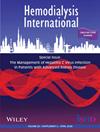Features associated with arteriovenous fistula patency. A meta-analysis
Abstract
Introduction
It is unclear if cannulation-associated variables such as timing of first cannulation, access creation method, cannulation technique, or needle type are associated with the outcomes of arteriovenous fistulas. We conducted a meta-analysis to investigate such potential associations with 1-year primary patency.
Methods
Twenty-eight publications with titles that included “arteriovenous fistula,” “patency,” “cannulation,” “metric,” “first cannulation,” “hemodialysis,” “complication,” “vascular,” “nursing,” and “puncture” were retrieved and reviewed.
Findings
The 1-year primary patency rates ranged from 0.32 to 0.93. Primary patency rates were significantly lower in patients in whom initial cannulation was done less than 1.5 months after fistula creation compared to fistulas first cannulated more than 1.5 months after anastomosis (odds ratio [OR] = 0.41, 95% confidence interval [CI]: 0.32–0.52). The effect of cannulation timing on primary patency rate was attenuated when plastic cannulas were used during the first two to three puncture weeks compared to metal needles (OR = 0.62 vs. 0.34; p = 0.032). Fistulas in the upper arm did not have a higher 1-year primary patency compared to those in the forearm (OR = 1.05, 95% CI: 0.93–1.19). Primary patency of upper arm arteriovenous fistulas was higher in reports from the Americas or Europe compared to reports from Asia. Buttonhole cannulation was not associated with higher patency rates at 1 year compared to rope-ladder cannulation (OR = 1.14, 95% CI: 0.75–1.71).
Discussion
Early cannulation was associated with reduced 1-year arteriovenous fistula patency. This association was reduced when plastic cannulas were used during the initial 2–3 weeks.

 求助内容:
求助内容: 应助结果提醒方式:
应助结果提醒方式:


